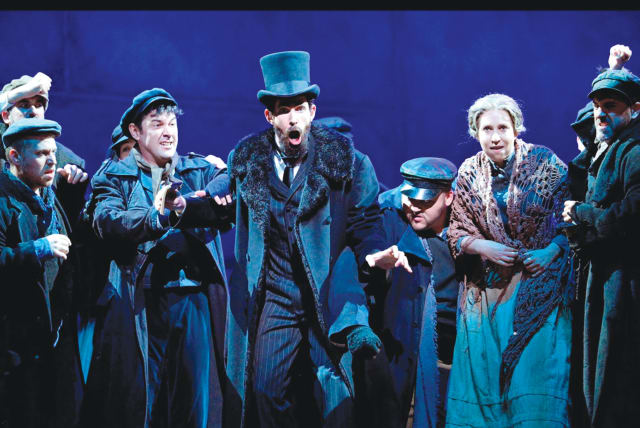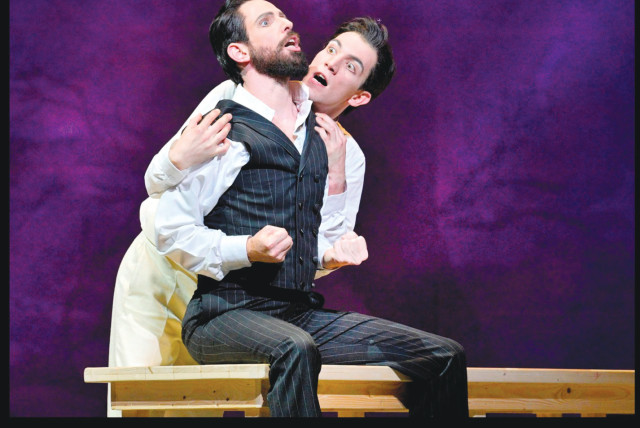Theodor, a Hebrew opera production about the life of Theodor Herzl, was so well received after its May 2023 premiere it was revived in December, filmed, and will now be screened in cinemas across the country in honor of the state Herzl imagined for its 76th Independence Day.
“I saw the last show during the original May run and was hooked,” EllaComm owner and CEO Ami Ella told The Jerusalem Post.
“It was important for us to bring this same emotion to the filmed adaptation and I think we were successful.”
An opera hit about Theodor Herzl
An opera hit, Theodor was created by librettist Ido Ricklin, composer Yonatan Cnaan, and conductor Nimrod David Pfeffer as a multi-layered opera. By using the plot device of an older, wiser Herzl (Oded Reich) reflecting on past decisions taken by his younger self (Noam Heinz) the audience is offered a rich musical and historical vision.
In one scene, Herzl and his companions heap praise on the musical brilliance of Richard Wagner, who was both a musical genius and a rabid antisemite. Cnaan used a snippet of Wagner’s music for this scene and also gifted the audience with nods toward Chopin, Sasha Argov, and Aviv Gefen as the opera unfolded.
“Not every content can be adapted to the large screen,” EllaComm SVP Business Development Sapir Ella said. “Theodor does. It is a wonderful human interest story.” Unlike her father, she watched footage of the opera, and supported the decision to invest in its film adaptation.
“When Daniel Jusidman,” the Mexican-Jewish businessman who supported the production, “saw Theodor, he very much wanted it to be a production-on-wheels and tour the country,” Heinz related. “Sadly, the scope of the production made that an impossibility. Thanks to the film adaptation, the production can now reach everybody.”
EllaComm has been screening film adaptations of operas since 2019 with the goal of presenting the public with an affordable, easy way to enjoy some of the finest festivals and productions in that genre.
“We have not raised the admission fee during all these years,” Ella said. “It is still NIS 89 per ticket with pensioners paying NIS 69.”
LIKE THEODOR, these productions are screened across the country. The current season includes Verdi’s Aida under conductor Christian Thielmann (Monday, June 3, 7 p.m. Jerusalem Theatre) and Rossini’s L’italiana in Algeri, directed by Hugo De Ana (Wednesday, June 5, 8 p.m. at Nes Ziona’s Culture Hall).
Jerusalem-based opera lovers already enjoy live transmissions from the Metropolitan Opera in New York offered at the Jerusalem Cinematheque for NIS 170 per ticket, but Ella pointed out these screenings are limited to one opera house, the Met, and lack Hebrew subtitles.
Like the filmed Met operas, which migrate from the silver screen to the online VOD service (NIS 57.5 per month or NIS 19 per one-day rental) Theodor will also be offered as part of Aria VOD. A streaming service is offered by EllaComm in partnership with Yes, Hot, Partner TV and others for NIS 24.9 per month. Aria VOD will also offer specific content co-created with composer and conductor Gil Shohat.
“Israelis like to see Israelis on the screen,” Sapir Ella said. “For us, Gil is the face of the Israeli world of culture.”
The filmed adaptation of Theodor offers wonderful insights that might have been missed even by those who attended the live performance. This is achieved thanks to excellent camera work, which offers the viewer splendid perspectives.
“Distance from the stage is one of the disadvantages of the opera,” Reich said. “This, at times, makes the characters seem unreal. We, as performers, see our partners closely. This is an aspect this filmed production captured well.”
“Viewers can actually see some of our little secrets,” Heinz added. “This is the first time I got to see the production myself,” he joked, as he was on stage performing it.
Thanks to German production company Unitel, the audience can see Anat Czarny, in the role of Theodor’s wife Julie, about to enter the stage from Reich’s perspective on stage. The camera movement from top to bottom, traveling the length from the incense smoke used at church to Reich himself, as he considers a mass conversion of the Jewish nation as a solution to antisemitism, offers a foretaste of the emotions to come.
Daniela Skorka, in the role of Paul von Portheim, was especially well served by a long shot during a key scene that emphasized her petite figure. This gave her character, a close friend of Theodor’s, a child-like dimension, which made the events of the scene much more tragic.
“This opera is presented during times that become increasingly more tense,” Heinz said. Noting that when the opera was shown in May, the audience erupted with ovations when Reich, in the role of Herzl, declared the Jewish state will be a democracy that honors minority rights.
“The audience experienced this line in the context of the judicial reforms,” Reich explained. “The filmed December production took place after the October 7 Hamas attack.”
Viewers of Theodor will see a weeping audience during a rendition of the national anthem after the opera ends. In this part of the film, Reich, Heinz, Czarny, Strul, and the rest of the cast bow with yellow ribbons – honoring those held hostage by Hamas – above their hearts.
“I stepped off the stage that night feeling uplifted,” Reich said.
“We are at war, and the audience claps when, from the stage, the call to look after the rights of those who are weak, those who are a minority, is sung,” he said.
“We are fighting for our home, but we do not forget what it means to be human.”
Thanks to Unitel, Theodor is meant to be screened at movie houses around the world. When asked if this seems doable during a time when Israeli artists are being canceled in many places, Ella shared that “we are not afraid of anything.”
“In Germany, the film is very likely to gain interest,” Heinz offered, “as many in Germany wish to understand the Israeli story better. As for the rest of the world, I fear there is a shortage of those who wish to listen.”
“It is not Theodor Herzl that is an obstacle to this production being shown worldwide,” Reich added, “it is the unprecedented historical moment we are now at.
“Once the war is over,” he offered, “there will come a time we, as Israelis, will need to start a new dialog with the world – at that time the film version of Theodor might be very relevant.”
“We will be delighted to screen Theodor outside the country and whatever happens will happen,” Ella added.
“It must first succeed here. If it does not succeed at home, why should it succeed elsewhere?”
Theodor will be released around the country on May 9. It will also be screened on May 16, at 6 p.m. at Jerusalem Theatre, at the Haifa Cinematheque on May 11, at 5 p.m. For more cities and information visit www.ariaonscreen.co.il/theodoropera








































































































